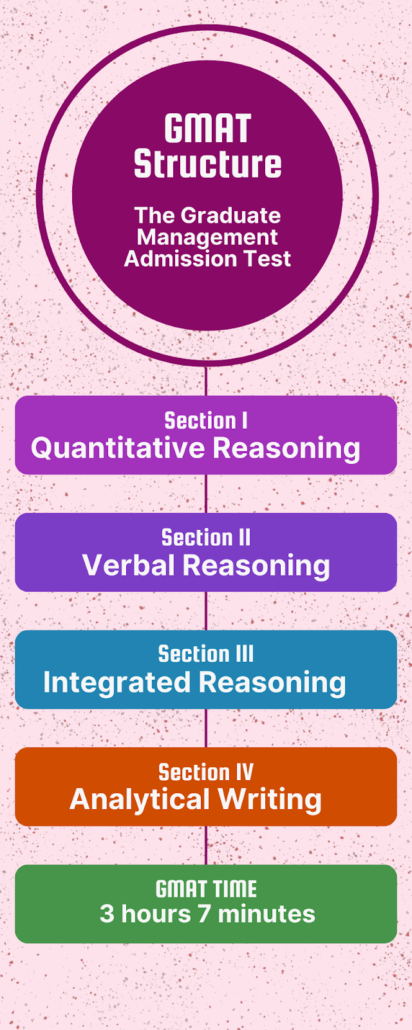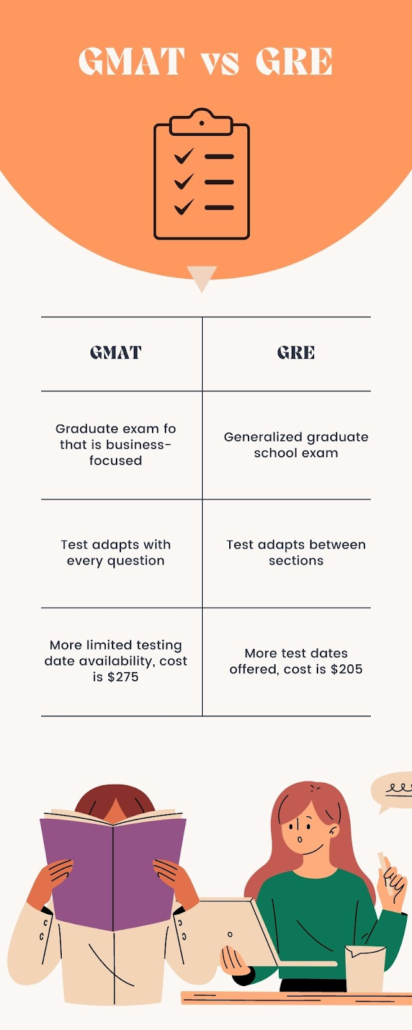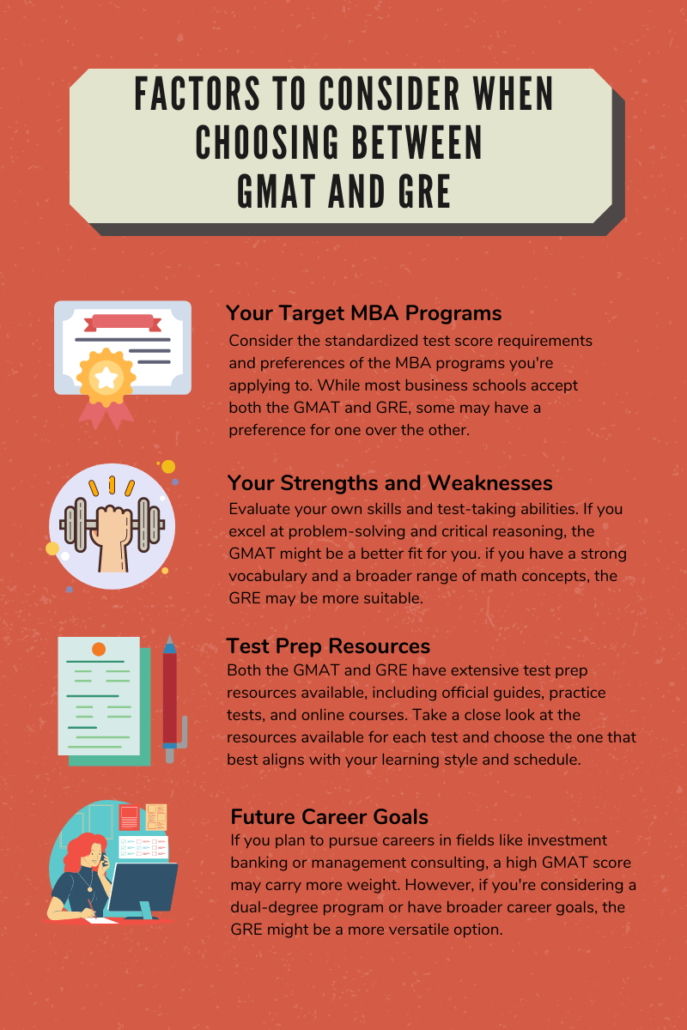
If you’ve made it to this article, you’re probably trying to decide between the GMAT and the GRE. Both of these are widely accepted graduate school exams, and while you can’t go wrong with taking them both, the time and effort needed to focus on both rather than one test cant make this impossible.

Deciding between the GMAT and GRE for your MBA application can be challenging. Both exams are standardized tests for business school admissions, but each has unique features and strengths.
Fret not!
In this comprehensive guide, we’ll help you navigate the GMAT vs. GRE conundrum by delving into the critical differences between the two exams, examining business schools’ preferences, and providing invaluable insights to make an informed decision for your MBA journey.
Understanding the GMAT

The Graduate Management Admission Test (GMAT) is a computer-adaptive test designed specifically for business school admissions. The exam consists of four sections: Analytical Writing Assessment, Integrated Reasoning, Quantitative Reasoning, and Verbal Reasoning. The total testing time is approximately 3.5 hours, including breaks.
GMAT Scoring
GMAT scores range from 200 to 800, with the average GMAT score around 568. For top business schools, this number shoots up to just shy of 700. Of course, what a good GMAT score is will depend on where you are applying. The Quantitative and Verbal sections contribute to the total score, while the Analytical Writing Assessment and Integrated Reasoning sections receive separate scores.
GMAT Fees
As of 2023, the GMAT exam fee is $275 in the United States and may vary in other countries. Additional fees may apply for rescheduling, canceling, or ordering additional score reports. Visit the official GMAT website for updated fee information in your region.
GMAT Test Centers and Test Dates
The GMAT is offered at test centers worldwide throughout the year. In addition, you can schedule your test appointment online through the official GMAT website, where you’ll also find a list of available test centers and dates.
Structure of the GMAT
The Graduate Management Admission Test is a standardized business school exam specifically designed for business school admissions. It consists of four sections: Quantitative Reasoning, Verbal Reasoning, Integrated Reasoning, and Analytical Writing Assessment. The GMAT is a computer-adaptive test, meaning the difficulty of questions adjusts based on your performance throughout the exam. This impacts your GMAT score.
Quantitative Reasoning
This section assesses your problem-solving and data interpretation skills through two types of questions: Problem-Solving and Data Sufficiency. The focus is on your ability to analyze data, draw conclusions, and apply basic arithmetic, algebra, and geometry concepts.
Verbal Reasoning
The Verbal Reasoning section measures reading comprehension, critical reasoning, and sentence correction abilities. This section evaluates your command of the English language and your ability to understand, analyze, and evaluate written material.
Integrated Reasoning
Integrated Reasoning is unique to the GMAT and assesses your ability to evaluate and synthesize information from multiple sources. This section includes four types of questions: Multi-Source Reasoning, Table Analysis, Graphics Interpretation, and Two-Part Analysis.
Analytical Writing Assessment
In the Analytical Writing Assessment, you’ll be required to analyze a given argument and write a critique of it. This section measures your critical thinking and communication skills, as well as your ability to organize and express your thoughts effectively in writing.
GMAT Test Duration
The GMAT takes approximately 3 hours and 7 minutes to complete, excluding breaks. The test is divided into the following durations for each section:
- Quantitative Reasoning: 62 minutes
- Verbal Reasoning: 65 minutes
- Integrated Reasoning: 30 minutes
- Analytical Writing Assessment: 30 minutes
Understanding the GRE
The Graduate Record Examination (GRE) is a general standardized test used for admissions to various graduate programs, including business schools. It consists of three sections: Verbal Reasoning, Quantitative Reasoning, and Analytical Writing. The total testing time is approximately 3 hours and 45 minutes, including breaks.
GRE Scoring
GRE scores range from 130 to 170 for the Verbal and Quantitative sections, while the Analytical Writing section is scored on a scale of 0 to 6. The average GRE scores for MBA applicants vary, but a competitive score is usually above the 80th percentile in both the Verbal and Quantitative sections.
GRE Fees
The GRE General Test fee is $205 in the United States and may vary in other countries. Additional fees for rescheduling, changing test centers, or ordering additional score reports may apply. Visit the official GRE website for updated fee information in your region.
GRE Test Centers and Test Dates
The GRE is offered at test centers worldwide throughout the year. You can schedule your test appointment online through the official GRE website, where you’ll also find a list of available test centers and dates.
Structure of the GRE
The Graduate Record Examination (GRE) is a standardized test used for admissions to various graduate programs, including business schools. It consists of three sections: Verbal Reasoning, Quantitative Reasoning, and Analytical Writing. Unlike the GMAT, the GRE is a section-adaptive test, meaning the difficulty of the second Verbal and Quantitative sections adjusts based on your performance in the first sections.
Verbal Reasoning
The Verbal Reasoning section measures your ability to understand and analyze written material, as well as evaluate relationships between component parts of sentences. This section consists of three types of questions: Reading Comprehension, Text Completion, and Sentence Equivalence. The focus is on your vocabulary, critical reading, and reasoning skills.
Quantitative Reasoning
This section assesses your problem-solving abilities and your understanding of basic mathematical concepts. The Quantitative Reasoning section includes four types of questions: Quantitative Comparison, Multiple-choice (select one answer), Multiple-choice (select one or more answers), and Numeric Entry. The questions cover arithmetic, algebra, geometry, and data analysis topics.
Analytical Writing
The Analytical Writing section consists of two tasks: Analyze an Issue and Analyze an Argument. In this section, you’ll be required to express your thoughts clearly and effectively in writing, demonstrate critical thinking, and present a well-structured argument.
GRE Test Duration
The GRE takes approximately 3 hours and 45 minutes to complete, excluding breaks. The test is divided into the following durations for each section:
- Verbal Reasoning (two sections): 30 minutes per section
- Quantitative Reasoning (two sections): 35 minutes per section
- Analytical Writing (two tasks): 30 minutes per task
Key Differences Between GMAT vs GRE

Exam Focus
The GMAT exam is tailored specifically for business school admissions and focuses on skills that are crucial for success in an MBA program. The GMAT quant section is known for its challenging data-sufficiency questions and a heavier emphasis on problem-solving. On the other hand, the GRE quant section includes more straightforward questions and a broader range of math concepts needed for graduate programs.
The GMAT verbal section emphasizes critical reasoning and sentence correction, while the GRE verbal section tests vocabulary and reading comprehension more extensively.
Test-Taking Flexibility
Both the GMAT and GRE are computer-adaptive tests, but they differ in how they adapt. For example, the GMAT adapts after every question, while the GRE adapts between sections. This difference may impact test takers’ strategies and how they manage test anxiety during the exam.
Cost and Availability
The GMAT exam costs $275, while the GRE exam costs $205. Both tests are offered throughout the year, but the GRE is more widely available regarding test centers and dates.
Key Similarities Between GMAT vs GRE
Accepted by Business Schools
Business schools widely accept both the GMAT and GRE for their MBA programs. In recent years, the number of schools accepting GRE scores has grown significantly, making it a viable alternative to the GMAT. Nevertheless, it is essential to research each business school’s specific requirements, as some may still prefer GMAT scores.
Skills Tested
Both the GMAT and GRE test your Verbal and Quantitative Reasoning abilities, as well as your Analytical Writing skills. While the question types and testing formats differ, both exams aim to evaluate the critical thinking, problem-solving, and language skills required for success in an MBA program.
MBA Admissions Consulting
Whether you choose the GMAT or GRE, MBA admissions consulting services can help you navigate the application process and optimize your chances of acceptance. These professionals offer guidance on selecting the right test, crafting a compelling application, and preparing for interviews.
Test Preparation
Regardless of whether you opt for the GMAT or GRE, you’ll need to dedicate a significant amount of time and effort to test preparation. However, both exams have a wealth of resources available, including official test prep materials, online courses, and private tutoring. By leveraging these resources and developing a study plan, you can improve your GMAT or GRE score and strengthen your business school application.
Computer-Based Testing
Both the GMAT and GRE are computer-based exams administered at test centers worldwide. While the GMAT is a computer-adaptive test and the GRE is a section-adaptive test, both exams require you to be comfortable with computer-based testing environments.
Scoring and Reporting
Both exams provide separate scores for their respective sections, with the GMAT score ranging from 200 to 800 and the GRE score ranging from 260 to 340. Business schools often compare GRE test takers’ scores to their GMAT equivalents to evaluate applicants fairly. Furthermore, both exams allow you to send score reports to the schools of your choice, with some additional fees for extra score reports.
By understanding these key similarities between the GMAT and GRE, you can make a more informed decision about which test to take for your MBA admissions journey. It’s crucial to consider your strengths, weaknesses, and the specific requirements of your target business schools to maximize your chances of success.
Which Test is Preferred by Business Schools?
Most business schools now accept GRE scores in addition to GMAT scores, making it a viable option for MBA applicants. However, some top business schools may still have a slight preference for the GMAT, given its specific focus on business skills. Therefore, it’s essential to research your target MBA programs’ preferences and requirements before choosing between the GMAT and GRE.

Factors to Consider When Choosing Between GMAT and GRE
Your Target MBA Programs
Consider the standardized test score requirements and preferences of the MBA programs you’re applying to. For example, while most business schools accept both the GMAT and GRE, some may prefer one over the other.
Your Strengths and Weaknesses
Evaluate your own skills and test-taking abilities. For example, if you excel at problem-solving and critical reasoning, the GMAT might better fit you. On the other hand, if you have a strong vocabulary and are more comfortable with a broader range of math concepts, the GRE may be more suitable.
Test Prep Resources
Both GMAT prep course and GRE study materials are available, including official guides, practice tests, and online courses. Look closely at the resources available for each test and choose the one that best aligns with your learning style and schedule.
Future Career Goals
If you plan to pursue careers in fields like investment banking or management consulting, a high GMAT score may carry more weight with potential employers. However, considering a dual-degree program or broader career goals, the GRE might be a more versatile option.
Preparing for the Test
Regardless of whether you choose the GMAT or GRE, thorough preparation is essential to achieve a competitive test score. Develop a study plan that includes a combination of self-study, practice tests, and test prep resources. Be sure to address any areas of weakness and refine your test-taking strategies to maximize your score.
Conclusion
Ultimately, the decision between the GMAT vs. GRE for MBA admissions will depend on your individual circumstances, strengths, and target business schools. Both tests have their unique advantages and challenges, so it’s essential to research each exam thoroughly and choose the one that best aligns with your goals and abilities.
Frequently Asked Questions
Most business schools now accept GRE scores, but verifying the standardized test requirements for each MBA program you’re considering is essential.
Yes. Some business schools prefer GMAT over the GRE exam. But since graduate business school admissions committees commonly accept both the GRE and GMAT, it’s important to look at exact school requirements.
The difficulty of the GMAT and GRE varies depending on an individual’s strengths and weaknesses. For example, some test takers may find the GMAT’s focus on critical reasoning and problem-solving more challenging. In contrast, others may struggle with the GRE’s emphasis on vocabulary and broader math concepts.
Yes, you can take both exams if you’re unsure which one will yield a more competitive score. However, taking both tests requires a significant investment of time and resources, so it’s advisable to research and choose the test that best suits your abilities.
Both GMAT and GRE scores are valid for five years from the test date.
Business schools typically use standardized test scores as one of several factors in the admissions process. Of course, a competitive test score can help bolster your application. Still, other factors like work experience, academic performance, and extracurricular activities also play a crucial role in the admissions process.
Business schools often convert GRE scores to their GMAT equivalent using a conversion tool provided by the Educational Testing Service (ETS) to evaluate applicants fairly. In addition, MBA admissions officers consider various factors, including test scores, work experience, essays, and interviews, to assess a candidate’s fit for their program.
While a high GMAT or GRE score can help offset a lower undergraduate GPA, top MBA programs consider multiple factors when evaluating business school applicants. A strong test score alone may not guarantee admission, as schools also look at work experience, leadership potential, essays, and recommendations. In addition, demonstrating growth and success in your professional life can help mitigate the impact of a low GPA.
Yes, it is possible to gain admission to a business school with a lower GMAT or GRE score, although it may be more challenging. MBA admissions officers consider the overall strength of your application, which includes work experience, essays, letters of recommendation, and interviews. Therefore, a compelling application that showcases your strengths, experiences, and potential can help you overcome a lower test score.
While most business schools require either the GMAT or GRE for MBA admission, some programs may offer waivers or have alternative requirements. Executive MBA programs, in particular, may accept the Executive Assessment (EA) or waive the standardized test requirement based on work experience and professional achievements. Therefore, it’s essential to research the specific requirements of each school before applying.
Both GMAT and GRE scores are valid for five years from your exam date. Business schools typically accept test scores within this validity period. If your scores are nearing expiration, you may want to retake the exam or apply to programs before the scores are no longer valid.
Bryce Welker is an active speaker, blogger, and regular contributor to Forbes, Inc.com, and Business.com where he shares his knowledge to help others boost their careers. Bryce is the founder of more than 20 test prep websites that help students and professionals pass their certification exams.












